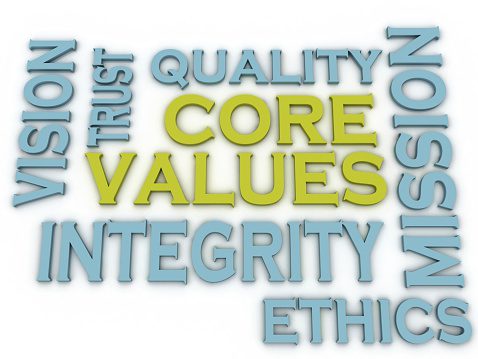
Well, as we all know, in business and in life, things change and breakups happen, so there may be a few instances where it makes sense to update core values.
Growing companies like Zappos have continued to refine and work on their core values over time to make sure they’re still relevant and working for them. However, if your values aren’t working for you, don’t just slap another poster on the wall. Core values shouldn’t be written then put on a shelf. They should be revisited often when you discuss strategy, and companies should continue to think of new ways to incorporate them into their culture.
Core values are about behavior. To live your core values means to behave in a way that is consistent with those values, both as an individual and as a company. Marriott International publicly states that, “Our core values make us who we are.” Whole Foods says, “Our core values are what’s truly important to us as an organization.” And Coca-Cola says that, “Our values serve as a compass for our actions and describe how we behave in the world.”
Here are 3 reasons—and only 3 reasons—why you might want to revisit your core values, and consider refining them if they are no longer guiding your company’s behavior and culture.
1. Your values are just a poster. I was visiting a company once and as many companies do, they had their core values displayed in the reception area. While I was waiting I asked the receptionist if she was enjoying living her core values and what they meant to her. She looked up and said she did not know what they were. They were displayed right behind her. All she had to do was turn around! She had been with the company for over a year. Sitting at the same desk every day!
If your team members don’t know what your core values are, then they are not working. This could just be because people are not educated on them. And if that is the case, then educate them. However, if your team members continue to not embrace them even after being educated on them, then maybe these core values were the wrong ones in the first place. Even though the executive team may believe that the values well represent the company, they may not, so you need to educate, observe and test them.
Zappos CEO, Tony Hsieh, spent a year observing and interviewing his entire company before settling on the 10 core values that they still use today.
There’s no benefit to having hollow core values. If you’re not using them to guide your behavior and decisions, they’re not working.
2. Your values are no longer relevant with the times. Companies that have been around for 70 years or more can dramatically evolve. If Tiffany & Co. kept the same values from when they were a stationery company back in 1837, they probably wouldn’t be dazzling as many customers today. When multiple generations of owners have come and gone, people don’t feel as connected to the values. You’ll hear things like “that’s not us anymore” or “back in the day when Jack was here…” Also, in this scenario, you’ll typically have a new team of executives who don’t relate to the core values either. Over time, behavior has changed in the company, so the values need to be updated to something everyone can embrace and get excited about.
3. If there’s an acquisition. Now, this one is tricky. When there is an acquisition, people often make the mistake of trying to blend the core values of both companies. However, what you end up with is a compromise that waters down culture and behavior patterns of both companies. Instead, choose to embrace the acquirer’s values and behavior. There can be only one set of core values.
Finally, resist the temptation to mess with stuff that works. If your employees know your values and are making good decisions, don’t touch them! Core values are the company’s roots. Don’t yank them out, unless they are dead.






